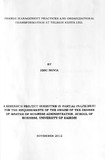| dc.description.abstract | Corporate bodies operate within the environment. This environment is continuously changing
and those within it have to make constant efforts to keep pace with the changes. As this happens,
situations do occur when revolutionary adjustments have to be made in order to effect far
reaching' changes to some organizations within the environment in order to make them survive,
turn them around back to profitability, make them attractive for sale etc. Such drastic changes are
also called corporate transformation.
This research project reviews briefly the history of Telkom Kenya the sole provider of
telecommunications services in Kenya up to 1999, its privatization process and the corporate
transformation practices employed in helping the company transform its corporate image. Prior
to the liberalization of the telecommunications industry, Telkom, a wholly Government owned
body, enjoyed monopoly in the market, had a bloated work force peaking at 24000 workers
which it carried comfortably until the industry, has liberalized. The monopolistic set-up bred complacency, poor service delivery and poor management practices.
The liberalization of the industry in 1999 came with unprecedented challenges to Telkom Kenya.
Firstly the new mobile technology was quickly gaining ground. It was versatile, quick to acquire
and perceived a savior to the many frustrated customers Telkom was unable to cater for
satisfactorily. The Government delinked the mobile telephone department from Telkom, named
it Safaricom and sold it separately. This marked the beginning of Telkom's diminishing
performance and hence its sale and need for corporate transformation.
This research therefore reviews the transactional process before the privatization and the
transformational practices being emlployed to change the image of the company and turn it
around back to profitability.
This research was conducted as a case study with the focus on senior managers at Telkom as the
respondents. Content analysis was used to analyze the qualitative data. (Mugenda and Mugenda).
vii
The research established that the privatization of Telkom was conducted well except for the final
phase which was rushed and done outside the privatization Act. The company has also
undertaken measures to redeem its image and improve services to customers. This study
recommends benchmarking with other similar operators before privatization, a review of the
TKL Vision and Mission statements and action by Government to stop cable theft.
The study also recommends further research in the privatization of public institutions with the
view of establishing reasons for failure and low success | en |

